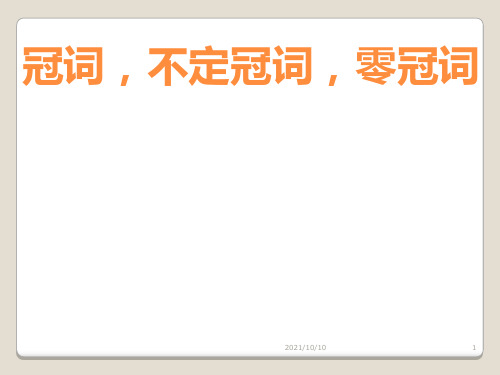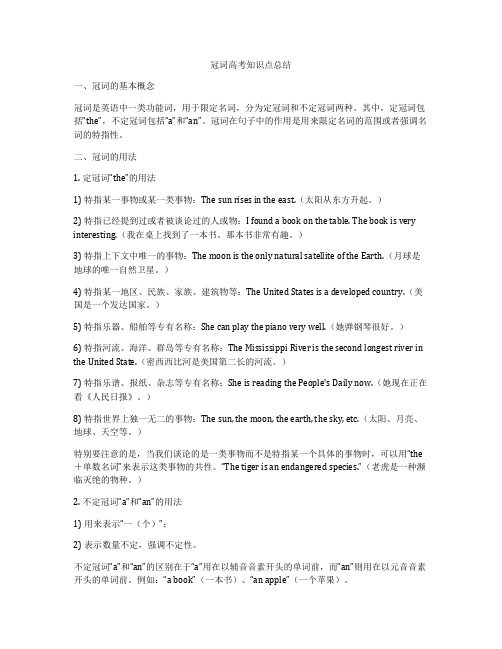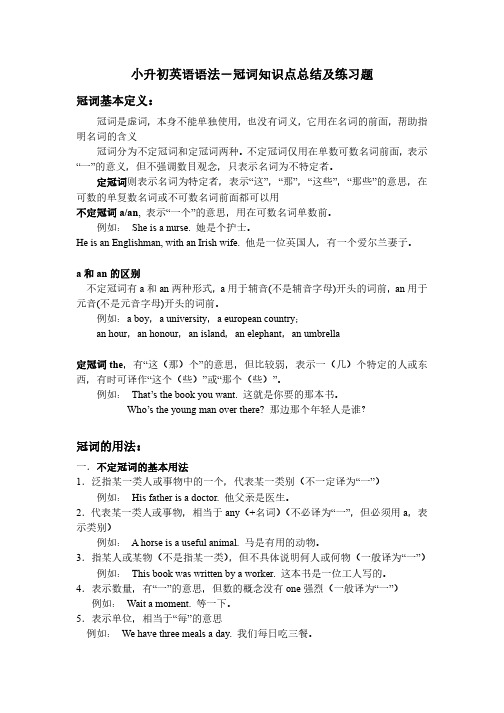英语语法总结冠词
英语语法—冠词,不定冠词,零冠词用法详解

疑难辨析
1. in front of 在……(外部的)前面 in the front of 在……(内部的)前面
(1) Don’t stand in front of the bus! It will start soon. 不要站在汽车前面!汽车很快就开了。
10. 用在表示方向、方位的名词前。
The sun rises in the east.
Li Ming is at the back of the door.
11. 姓氏复数前加定冠词,表示全家。
the Johns 约翰一家
12. “the+形容词比较级,the+形容词比较级”表示“越…越…”。
The earlier you go, the sooner you will be back.
1. I had a big breakfast this morning.
今天早上我饱餐了一顿。
2. He gave us a good breakfast.
他款待了我们一顿很好的早餐。
当两个并列的单数名词同指一个人或物时,后一个名词前不用不定冠 词;如果后一个名词前也用不定冠词,则指两个人或物。
7. 在江河、海洋、湖泊、山脉、群岛前要加定冠词。 the Pacific Ocean 太平洋 但 Mount Tai(泰山)前不加冠词
8. 由普通名词构成的专有名词前要加定冠词。 The Great Wall
2021/10/10
பைடு நூலகம்
9
9. 乐器名称前要加定冠词the。
The little girl can play the piano very well.
大学英语语法总结(全面)

大学英语语法总结(全面)大学英语语法总结(全面完整版)1. 介词(Prepositions)- 表示地点:at, in, on- 表示时间:at, in, on- 表示方式:by, with- 表示原因:because of, due to- 表示目的:for, to2. 冠词(Articles)- 定冠词:the- 不定冠词:a, an3. 代词(Pronouns)- 主格代词:I, you, he, she, it, we, they- 宾格代词:me, you, him, her, it, us, them- 所有格代词:my, your, his, her, its, our, their- 反身代词:myself, yourself, himself, herself, itself, ourselves, themselves4. 名词(Nouns)- 单数名词:book, chair, dog- 复数名词:books, chairs, dogs- 不可数名词:water, money, information5. 动词(Verbs)- 一般现在时:I walk, you walk, he/she/it walks, we walk, they walk- 一般过去时:I walked, you walked, he/she/it walked, we walked, they walked- 现在进行时:I am walking, you are walking, he/she/it is walking, we are walking, they are walking- 过去进行时:I was walking, you were walking, he/she/it was walking, we were walking, they were walking- 一般将来时:I will walk, you will walk, he/she/it will walk, we will walk, they will walk6. 形容词(Adjectives)- 描述名词特征:big, small, tall- 比较级:bigger, smaller, taller- 最高级:biggest, smallest, tallest7. 副词(Adverbs)- 表示方式:quickly, slowly- 表示程度:very, extremely- 表示时间:now, yesterday8. 连词(Conjunctions)- 表并列:and, or- 表递进:furthermore, moreover- 表转折:however, but- 表原因:because, since以上是大学英语语法的简要总结,希望对你有帮助。
英语语法冠词

例:Mr Li, the tutor was no better a schoolar than many a nine –form boy.
表示特指的人或事物。如:The man with a flower in his hand is Jack..(手上拿着一朵花的男人是杰克)
复述前面提到过的人或事物。如:There is a man under the tree. The man is called Robert.(树下有个人, 那个人叫罗伯特。)
02
表示某类人或事物,以区别于其他种类。如:An elephant is much stronger than a man.(大象比人强壮多了。)(不能译为:一头大象比一个人强壮。)
03
1、不定冠词a / an的用法:
(3).表示“一个……另一个…”之意时用 one 而不用a 例:One man’s meat is another man’s poision人各有志。 另:在下列情况下,a,one可以互换: 例:in a/one word简而言之,a/one hundred percent百分之百,十足 (4).用在单数名词前,相当于某一个或某一位,抑或用在物质名词或抽象名词表“一阵”,“一份”等或表抽象名词具体化。 例:a. A Mr Li called you tonight,(某一位) b.Unfortunately , only the poor boy was caught in a heavy rain (表一阵) c.Through their efforts , their experiment was quite a great success.(抽象名词具体化) (5) a/an可表“每一”之意 例:I go there once a week to ensure that everything is ok.(每一周)
英语语法知识——冠词

in danger处于危险中lose weight减肥
(1)泛指一类人或物中的任何一个,表示“这一类事物 中的任何一个都具有这种特点”。
如:A parrot can speak like a person. 鹦鹉能像人一样说 话。
(2)笼统的指某类中的某一个,但又不具体说明是哪一 个。
如:A boy is crying there. 有一个男孩儿在那儿哭。 (3)表示“一”,类似数词one,但语气比one要弱。
make. 你越仔细,出的错就越少。
(7)与某些表示特征,特性,品质等方面的形容词连 用,这类用法往往具有复数概念。
如:The rich are not always happier than the poor. 富人不总是比穷人开心
(8)用于逢整十的数词前的复数前,指世纪中的年代。
如:in the thirties在30年代
如:He spent a day painting the house. 他一整天都在数的增加。 如:Can I eat a second apple? 我可以再吃一个苹果吗?(吃第二个)
(5)用于物质名词之前,使其转化为具体名词,表 示“一种,一杯,一场”等意思。
(4)用于序数词和形容词最高级前。 如:the second第二 the best最好的
(5)用于乐器名词前。 如:the piano钢琴 the guitar吉他
冠词高考知识点总结

一、冠词的基本概念冠词是英语中一类功能词,用于限定名词,分为定冠词和不定冠词两种。
其中,定冠词包括“the”,不定冠词包括“a”和“an”。
冠词在句子中的作用是用来限定名词的范围或者强调名词的特指性。
二、冠词的用法1. 定冠词“the”的用法1) 特指某一事物或某一类事物:The sun rises in the east.(太阳从东方升起。
)2) 特指已经提到过或者被谈论过的人或物:I found a book on the table. The book is very interesting.(我在桌上找到了一本书。
那本书非常有趣。
)3) 特指上下文中唯一的事物:The moon is the only natural satellite of the Earth.(月球是地球的唯一自然卫星。
)4) 特指某一地区、民族、家族、建筑物等:The United States is a developed country.(美国是一个发达国家。
)5) 特指乐器、船舶等专有名称:She can play the piano very well.(她弹钢琴很好。
)6) 特指河流、海洋、群岛等专有名称:The Mississippi River is the second longest river in the United State.(密西西比河是美国第二长的河流。
)7) 特指乐谱、报纸、杂志等专有名称:She is reading the People's Daily now.(她现在正在看《人民日报》。
)8) 特指世界上独一无二的事物:The sun, the moon, the earth, the sky, etc.(太阳、月亮、地球、天空等。
)特别要注意的是,当我们谈论的是一类事物而不是特指某一个具体的事物时,可以用“the +单数名词”来表示这类事物的共性。
“The tiger is an endangered species.”(老虎是一种濒临灭绝的物种。
小升初英语语法-冠词知识点总结及练习题

小升初英语语法-冠词知识点总结及练习题冠词基本定义:冠词是虚词,本身不能单独使用,也没有词义,它用在名词的前面,帮助指明名词的含义冠词分为不定冠词和定冠词两种。
不定冠词仅用在单数可数名词前面,表示“一”的意义,但不强调数目观念,只表示名词为不特定者。
定冠词则表示名词为特定者,表示“这”,“那”,“这些”,“那些”的意思,在可数的单复数名词或不可数名词前面都可以用不定冠词a/an,表示“一个”的意思,用在可数名词单数前。
例如:She is a nurse.她是个护士。
He is an Englishman,with an Irish wife.他是一位英国人,有一个爱尔兰妻子。
a和an的区别不定冠词有a和an两种形式,a用于辅音(不是辅音字母)开头的词前,an用于元音(不是元音字母)开头的词前。
例如:a boy,a university,a european country;an hour,an honour,an island,an elephant,an umbrella定冠词the,有“这(那)个”的意思,但比较弱,表示一(几)个特定的人或东西,有时可译作“这个(些)”或“那个(些)”。
例如:That’s the book you want.这就是你要的那本书。
Who’s the young man over there?那边那个年轻人是谁?冠词的用法:一.不定冠词的基本用法1.泛指某一类人或事物中的一个,代表某一类别(不一定译为“一”)例如:His father is a doctor.他父亲是医生。
2.代表某一类人或事物,相当于any(+名词)(不必译为“一”,但必须用a,表示类别)例如:A horse is a useful animal.马是有用的动物。
3.指某人或某物(不是指某一类),但不具体说明何人或何物(一般译为“一”)例如:This book was written by a worker.这本书是一位工人写的。
英语语法冠词零冠词定冠词不定冠词
冠词冠词是一种虚词,用在名词或名词词组的前面,表示名词的特指或泛指。
冠词分为不定冠词和定冠词两种形式。
(一)不定冠词不定冠词有两个:a和an。
不定冠词用在以辅音音素开头的名词或名词词组前,不定冠词an则用在以元音音素开头的名词或名词词组之前。
1.不定冠词a和an都用在单数可数名词之前,泛指某一类人或事物中的一个,或第一次提到的人或事。
如:Zhang Pin has an apple in her bag.There are twelve months in a year.2.用其中的任何一个表示他们所属种类的特征如:An English teacher teaches us English.3.用在事物的量度单位前,如时间、速度、价格等,表示“每一”。
如:I go to the park twice a week.4.用在序数词前表示数量或序数的增加,译为“再一”,“又一”。
如:He bought a second bike.5.一些固定搭配必须带不定冠词a。
如:have a walk 散步,have a party 举行晚会,have a rest 休息一下(二)定冠词定冠词the有this, that, these, those 等意义。
用于单数名词或复数名词前,主要用来特指,使一个或几个事物区别于其他所有同类的事物。
1.用来特指某人或者某事物如: Is this the pen you are looking for?2.用来指谈话双方都知道的人或事物如:Open the book,please!3.用来指上文中提到过的人或物如:I have a dog. The dog is cute.4.用来表示世界上独一无二的事物或自然现象或用在方向、方位名词前如:the sun/the moon/the earth5.与单数名词连用表示一类人或事物如:The tiger is too dangerous.6.与某些形容词连用,使形容词名词化,表示某一类人或物如:the poor 穷人,the rich 富人,the young 年轻人7.用在序数词或形容词最高级前如:This is the highest mountain in the world.8.用在乐器、文艺活动、运动场所的名词前如:She can play the piano.9.用在江河、湖海、山脉、群岛的名称之前如:The Yangtze river is the longest in China.10.用在姓氏复数之前表示夫妇或一家人如:The Smiths are very kind.11.用在一些习惯用语如:in the morning, by the way, in the end(三)零冠词零冠词是指名词前没有不定冠词、定冠词,也没有其他限定词的情况1.在学科、球类运动、一日三餐名称的名词前常不加冠词如:Chinese,basketball, breakfast2.在节假日、月份、季节、星期前常不加冠词如:Mother’s day, Monday,spring, Sunday3.表示泛指或一般概念的物质名词或抽象名词前常不加冠词如:Failure is the mother of success.4.表示类别的复数名词前常不加冠词如:Students are playing basketball.5.大多数专有名词前常不加冠词如:Do you know Nanjing Road?6.名词前有代词所有格等限定词时常不加冠词如:her bag, this book7.在称呼、头衔或表示职位的名词前常不加冠词如:We made him head of our class.8.在一些固定词组中不加冠词如:at night, on foot。
英语语法复习之冠词
8.用在某些固定词组中。 have a swim=swim take a bath 洗澡 have a fever 发烧 have a rest 休息 once upon a time 从前 have a good time keep a diary all of a sudden do somebody a favor make a face
•
英语语法复习 之冠词
一、冠词的分类
• 1)不定冠词 泛指一类人或事物中的任何一个,但不强 调数目观念。 a, 用在以辅音音素开头的单词前,a house, an用在以元音音素开头的单词前,an hour • 2)定冠词 the, 表示特指的某一个或某一些人活事物
二、冠词的用法
1)不定冠词的基本用法 1.用于可数名词的单数形式前,表示泛指 或 类指,指人或事物的某一种类。 He wants to be a doctor. • 2.指某人或某物,但不具体说明何人或何 物。 • A girl is looking for Mr. Right. • 3.表示数量“一”,相当于“one”。 • I’ll return in a day or two.
三、不用冠词的情况 1.不含普通名词的专有名词、物质名词、抽象名词、人名、地名 等名词前,一般不加冠词,如:China,America, paper, peace。 2. 一些抽象的不可数名词前,不加冠词,如:Life is short, art is long. 3.季节、月份、星期、节日、一日三餐名称前一般不加冠词,如: Winter, March,Sunday, Christmas, have supper。 4.称呼语前不加冠词。 What shall I do next,Mother? 5.表示独一无二的头衔、职务名词作表语、同位语或补足语时, 一般不加冠词。Dr. Wang Professor Zhang
小学英语语法——冠词知识点讲解+练习
小学英语语法——冠词知识点讲解+练习冠词的概述:冠词是一种用来表示名词特性的词语,它与名词紧密相连,用于说明名词的可数性、单复数、泛指或特指等特性。
冠词通常放在名词前面,不能单独存在。
冠词分为不定冠词和定冠词两种形式。
不定冠词有a和an两种形式,其中a用于辅音音素开头的词前,an用于元音音素开头的词前。
定冠词只有the一种形式。
冠词的使用分为泛指、特指和类指三种情况。
泛指用于指首次提到的、不限定的人或物;特指用于指上文已提到的人或物,或是指被限制性修饰语在其后加以限定的人或物,也可以是指说话者双方都清楚的特定的人或事物;类指用于表示类别。
冠词的具体用法如下表所示:冠词类型用法例句不定冠词泛指单一、每一、任一事物 a(n) A book is on the table。
类指类别 A XXX can fly。
定冠词上文提到过的人或事物 The boy is in the classroom。
特指被限制性修饰语所限定的人或事物 XXX。
说话双方都清楚的人或事物 XXX。
世上独一无二的事物 XXX。
类指类别 XXX。
零冠词名词前泛指人或事物 Cats are cute。
类指类别 XXX。
冠词考点纵览:冠词的考点主要包括不定冠词a/an的用法、泛指和特指的区别、类指的使用等。
具体例题如下:考点一:不定冠词a/an的用法1) This is a book。
这是一本书。
2) There is a boy in the classroom。
教室里有一个男孩。
3) That XXX。
那是一个书包。
考点二:泛指人或事物的某一类别,以区别于其他种类。
1) A plane is a machine that can fly。
飞机是一种能飞的机器。
2) A tiger XXX 老虎可能会很危险。
3) A horse is XXX。
马对人类有用。
考点三:泛指某人或某物。
1) A girl is waiting for you。
英语语法大全:冠词
以下是为⼤家整理的关于《英语语法⼤全:冠词》⽂章,供⼤家学习参考!⼩编推荐:| | | | | 1、不定冠词a, an a⽤在辅⾳⾳素开头的词前 eg. a book, a useful book an⽤于元⾳开头的词前. eg. an apple, an hour 2、定冠词the 1)特指某⼈/某物 The book on the desk is mine. 2)世上独⼀⽆⼆的事物前 the sun , the moon, the earth, the sky 3)形、副级及序数词前 The third boy is the tallest of all. 注意: He is my first English teacher. 4)the + 姓的复数表⽰ “某家⼈”或“某夫妇”。
the Greens 格林⼀家/ 格林夫妇 3、不⽤冠词的⼏种情况: 1)在星期、⽉份、季节前不⽤冠词 2)学科名词前 3)球类运动及早、中、晚三餐名词前(但:①当三餐名词前有修饰词时,则要加适当的冠词. ②表乐曲演奏的名词前应加the) 1) He went to school after he had a quick breakfast. 2) play the violin / piano 在有些词组中,⽤冠词和不⽤冠词意思有较⼤区别。
in hospital(在住院);in the hospital(在医院) in prison( );in the prison( ) at table(吃饭,⽤餐);at the table(在桌旁) in front of(在某个范围之外的前⾯);in the front of(在某个范围之外的前⾯) go to college(上⼤学);go to the college(去那所⼤学) take place(发⽣);take the place(代替) 练习 ( )1.There is ____ “s” in ____ word “bus”.A. a ; aB. an ; theC. a ; theD. an ; a ( )2.Maths is ___ useful subject. You can’t drop it , I think.A. anB. aC. theD. / ( )3.____ bad weather it is!A. HowB. What aC. How aD. What ( )4.—What color is ___ orange? --It’s _____ orange.A. an; anB. an ; theC. an ; /D. / ; an ( )5.Mr. Li is ____ old worker.A. anB. aC. someD. / ( )6.Look at ____ picture! There’s ____ house in it.A. a ; aB. the ; theC. a ; theD. the; a ( )7.One morning he found ____ handbag. There was ___ “s” on the corner of ___ handbag.A. a ; an ; theB. a ; a ; theC. a ; a ; aD. the ; an ; a ( )8.What ___ interesting story it is!A. aB. anC. theD. / ( )9.Meimei is ___ best student in her class.A. aB. anC. /D. the ( )10.Tom is ___ kind boy. All ___ students love him.A. a ; /B. a ; theC. an ; /D. an ; the ( )11.Is ___ book on the desk mine? Yes.A. theB. aC. anD. / ( )12.Even while he was in ___ hospital, he went on writing songs.A. aB. anC. theD. / ( )13.Don’t read _____.A. in bedB. in the bedC. on bedD. on the bed ( )14.Smith is ____ honest man.A. aB. theC. anD. / ( )15.China has ___ population of 1,200,000,000.A. /B. anC. theD. a ( )16.What’s ____ for “椅.⼦”?A. EnglishB. an EnglishC. the EnglishD. any English ( )17.Mary is ___ cleverer of the two girls.A. theB. aC. anD. much ( )18.____ young must look after ___ old.A. The ; aB. The ; theC. A ; aD. A ; the ( )19. ___ earth is one of ____ planets.A. The ; sun’sB. The ; the sunC. The ; the sun’sD. The ; the suns’ ( )20.Tokyo is ___.A. the capital of JapanB. capital of JapanC. Japan capitalD. a capital of Japan ( )21.Kate sometimes plays ___ violin(⼩提琴) and sometimes plays ___ table tennis before supper.A. / ; theB. the ; /C. the ; theD. / ; / ( )22. –Have you seen ___ pencil? I left it here this morning. --Is it ___ red one ? I saw it.A. a ; theB. the ; theC. the ; aD. a ; a ( )23.There is_______ orange tree behind_____ house.A. an ; theB. a ; aC. the ; theD. an ; / ( )24.—How long did you stay there ? --About half ___ hour.A. /B. oneC. aD. an 练习题答案: 1——5 DBDCA 6—10 DABDB 11—15 ADACD 16—20 AABCA 21—24 BDAD。
- 1、下载文档前请自行甄别文档内容的完整性,平台不提供额外的编辑、内容补充、找答案等附加服务。
- 2、"仅部分预览"的文档,不可在线预览部分如存在完整性等问题,可反馈申请退款(可完整预览的文档不适用该条件!)。
- 3、如文档侵犯您的权益,请联系客服反馈,我们会尽快为您处理(人工客服工作时间:9:00-18:30)。
英语语法总结冠词
不定冠词:
不定冠词"a"用来表示可数名词的单数形式,用于辅音音素前,an用于元音音素前。
如:a person, a day, an hour, an old man...
定冠词用法:
1.用于双方都知道的名词前:Please clean the classroom.
2.用于单数名词前,表示一类人或物:
The horse is a useful animal.(马是有用的动物)
This is a very hard job for the teacher.(对于老师这是一项很难的工作。
)
3.用于世界上独一无二的东西前:the sun, the spring.
4.用于方位名词前:People in the west like coffee very much.
5.用于乐器名词前:play the violin
6.用于计量单位前:Gasoline is sold by the gallon.
7.形容词最高级和序数词前:
This is the easiest way to work out the problem.
He came to see me for the first time.
8.用于江河湖海山脉名称前:the Pacific,the Thames,the Rocky Mountains
9.杂志、报刊名称前:the Times,the Overseas Digest
10.用于建筑物、和组织前:the White House,
the Ministry of Education
11.用于姓氏复数前,表“某某夫妇,某某一家人:the Smiths,the Greens
12.用于形容词前,表一类人/ 物:the rich, the blind
13.用于English,Chinese,French 等名词前,表“全体国民”:the English,the Chinese
以下情况不用冠词:
1.三餐前breakfast,lunch,supper, ... Have you had lunch?
2.体育运动项目前play chess,... I have no interest in tennis.
3.在由by引出的交通工具前by air(乘飞机),by car
4.在称呼或职位前He has been elected president of the committee.
5.习惯用语前at school,day by day,at table(在吃饭),go to church(做礼拜)...。
